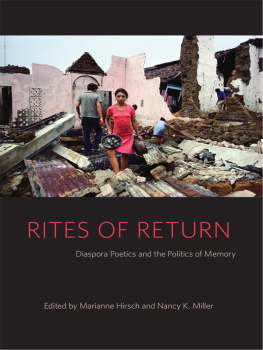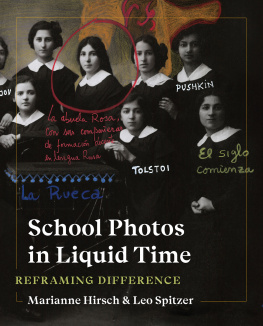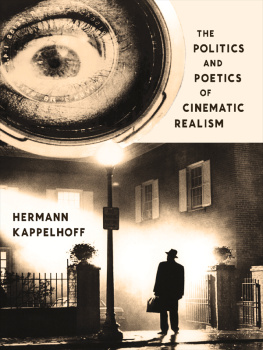Hirsch Marianne - Rites of return: diaspora poetics and the politics of memory
Here you can read online Hirsch Marianne - Rites of return: diaspora poetics and the politics of memory full text of the book (entire story) in english for free. Download pdf and epub, get meaning, cover and reviews about this ebook. City: New York, year: 2011, publisher: Columbia University Press, genre: Home and family. Description of the work, (preface) as well as reviews are available. Best literature library LitArk.com created for fans of good reading and offers a wide selection of genres:
Romance novel
Science fiction
Adventure
Detective
Science
History
Home and family
Prose
Art
Politics
Computer
Non-fiction
Religion
Business
Children
Humor
Choose a favorite category and find really read worthwhile books. Enjoy immersion in the world of imagination, feel the emotions of the characters or learn something new for yourself, make an fascinating discovery.
- Book:Rites of return: diaspora poetics and the politics of memory
- Author:
- Publisher:Columbia University Press
- Genre:
- Year:2011
- City:New York
- Rating:5 / 5
- Favourites:Add to favourites
- Your mark:
- 100
- 1
- 2
- 3
- 4
- 5
Rites of return: diaspora poetics and the politics of memory: summary, description and annotation
We offer to read an annotation, description, summary or preface (depends on what the author of the book "Rites of return: diaspora poetics and the politics of memory" wrote himself). If you haven't found the necessary information about the book — write in the comments, we will try to find it.
Rites of return: diaspora poetics and the politics of memory — read online for free the complete book (whole text) full work
Below is the text of the book, divided by pages. System saving the place of the last page read, allows you to conveniently read the book "Rites of return: diaspora poetics and the politics of memory" online for free, without having to search again every time where you left off. Put a bookmark, and you can go to the page where you finished reading at any time.
Font size:
Interval:
Bookmark:
RITES OF RETURN
RITES OF RETURN
Diaspora Poetics and the Politics of Memory
edited by
Marianne Hirsch
and Nancy K. Miller
Columbia University Press New York

Columbia University Press
Publishers Since 1893
New York Chichester, West Sussex
cup.columbia.edu
Copyright 2011 Columbia University Press
All rights reserved
E-ISBN: 978-0-231-52179-6
Library of Congress Cataloging-in-Publication Data
Rites of return : diaspora poetics and the politics of memory / edited by Marianne Hirsch and Nancy K. Miller.
p. cm. (Gender and culture)
Includes bibliographical references and index.
ISBN 978-0-231-15090-3 (cloth: acid-free paper)ISBN 978-0-231-15091-0 (pbk.: acid-free paper)ISBN 978-0-231-52179-6 (e-book)
1. Return in literature. 2. Feminist literary criticism. 3. Collective memory and literature. 4. Discourse analysis, Narrative. 5. Poetics.
I. Hirsch, Marianne. II. Miller, Nancy K.,
1941 III. Title. IV. Series.
pn56.r475r58 2011
306dc22
2011010557
A Columbia University Press E-book.
CUP would be pleased to hear about your reading experience with this e-book at .
References to Internet Web sites (URLs) were accurate at the time of writing. Neither the author nor Columbia University Press is responsible for Web sites that may have expired or changed since the book was prepared.
For our students
Contents
The twenty-first century seems strangely attached to the past. The losses suffered in the last century and the atrocities that have dominated its history continue to preoccupy our imaginations. A long-standing legacy of violence, compounded by new disasters, has engendered a set of ritesboth individual and collectivethat have taken many forms: the reconstruction of past histories, the retrieval of lost communities, the activation of historic sites, and a quest for origins.
In the first decade of the century, the turn to roots has been supported and stimulated by the vast resources of the Internet and other new or recycled technologies of research. With the decoding of the human genome in 2000, the science of genetics seemed to offer a reliable way to decipher difference through the language of genes. But, through a perhaps predictable feedback loop, the desire to recapture the past and to retrieve its stories also led to the creation of new products, like Macintoshs Reunion software, designed to organize family history into genealogical trees, or readily accessible DNA test kits to establish and prove lineage. These consumer products, in turn, enable, and underwrite, the quest and feed nostalgic fantasies about homecoming.
As both a record and interpretation of this complexly intertwined phenomenon, Rites of Return offers a set of critical approaches to our contemporary obsession with the past that entails a simultaneous commitment to acknowledgment and repair. Cutting across disciplinary boundaries, our project takes shape in the face of a worldwide refugee crisis, ongoing wars, natural disasters caused by human neglect, political upheavals, and the displacements caused by economic globalization.
Rites of Return emerges from several years of conversation between the two of us and our shared meditations on the question of return. Wanting to find a concrete expression to our joint preoccupation, we experimented first with a conference, Rites of Return: Poetics and Politics, held at both our institutionsthe Graduate Center of the City University of New York and Columbia Universityin the spring of 2008. Thanks to the support of Aoibheann Sweeney, executive director of the Center for the Humanities at the Graduate Center (CUNY), and to Laura Ciolkowski, associate director of the of the Center for the Critical Analysis of Social Difference at Columbia, we were able to bring together scholars, writers, artists, photographers, and legal scholars for two days of intense exchange.
The success of this event led us to want to think further about the feminist implications and contributions to an expansive, reimagined scholarship on diaspora and the new genealogy, cultural memory, and the paradoxes of nostalgia. The present volume builds on the conference by expanding its historical, geographical, and conceptual range. What began as a conversation between two feminist literary and cultural critics preoccupied with acts of return in our own lives and writing has morphed into a broader inquiry into the preoccupation with return and its vicissitudes that we share with the contributors to these pages.
As we enter the second decade of the twenty-first century, with the fallout from the greatest man-made environmental disaster of U.S. history, the Gulf of Mexico oil spill, and legislation easing immigration into the United States still being debated, we hope to engage these difficult, often intractable issues through personal, scholarly, and artistic contributions. Rites of Return confronts the responsibilities and ethics of the Janus-like effort entailed in looking back to the past and forward to the future at the same time.
We are indebted to a number of colleagues who joined us at various stages of this project. Aoibheann Sweeney deserves special thanks for her guidance in the planning and execution of the Rites of Return conference, as well as her intellectual rigor. The conference also served as the inaugural event of the newly formed Center for the Critical Analysis of Social Difference, and we are grateful to Columbia president Lee Bollinger for his support. Saidiya Hartman and Jean Howard, co-conveners with Marianne Hirsch of the CCASD working group on Engendering Archives, offered valuable advice and inspiration.
At various stages of the books evolution, we benefited from the wisdom, time, and extraordinary talents of several young scholars to whom we are deeply grateful: Marta Bladek, Jenny James, Sherally Munshi, and Sonali Thakkar helped us to think further by offering constructive editing and critique of the project from its inception, as did Cat Bohannon and Mikhal Dekel in their reading of the introduction. Vina Trans artistic and editorial abilities helped create our beautiful conference program and brought the manuscript to its final form.
The Columbia University Seminar on Cultural Memory provided a forum for a critical discussion of our project and its introduction, and we especially want to recognize the support of the Schoff Fund for its generous assistance.
We are also grateful to Jennifer Crewe, editorial director, Columbia University Press, and Victoria Rosner, coeditor of the Gender and Culture Series, for their support of this book and for the critical perspective of the anonymous readings of the manuscript. Most of all, we want to acknowledge our contributors. Thanks to them, we continue to believein good feminist traditionthat some topics are best explored through the collaborative genre of the conference and the edited volume.
To be rooted is perhaps the most important and least recognized need of the human soul, philosopher Simone Weil declared in the chapter Uprootedness of her famous 1949 essay, The Need for Roots. Emerging from the European aftermath of World War II, Weils belief has not ceased to resonate in popular consciousness as well as in theoretical reflections on displacement and dispossession that have come to characterize our modernity. But, Weil also argued, Every human being needs multiple roots.
In the United States, Alex Haleys Roots gave a name and shape to the longing for a verifiable identification of personal and cultural beginnings. The tremendous success of Haleys 1976 Pulitzer Prizewinning book and television miniseries attested to the fact that that identification needed more than research into the group genealogy of displaced peoples: it required the hook of a personal journey to an ancestral homeland.
Next pageFont size:
Interval:
Bookmark:
Similar books «Rites of return: diaspora poetics and the politics of memory»
Look at similar books to Rites of return: diaspora poetics and the politics of memory. We have selected literature similar in name and meaning in the hope of providing readers with more options to find new, interesting, not yet read works.
Discussion, reviews of the book Rites of return: diaspora poetics and the politics of memory and just readers' own opinions. Leave your comments, write what you think about the work, its meaning or the main characters. Specify what exactly you liked and what you didn't like, and why you think so.









